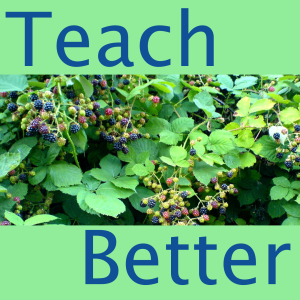
Podcast #9: Bringing Students into the Conversation with Vida Maralani
 2015-06-01
2015-06-01
In this episode, Vida Maralani, Yale Assistant Professor of Sociology, joins us with two of her students, Dan Rubins and Avery Jones. Together, we talk about how Vida teaches classes on social issues and quantitative methods to both undergraduate and graduate students.
You can subscribe to the Teach Better Podcast through your favorite podcast app or simply subscribe through iTunes if you don’t have one yet.
Show Notes0:00 ⏯ Intro
0:39 ⏯ We welcome Professor Maralani and our first ever student guests, Avery Jones and Dan Rubins.
3:49 ⏯ Dan came for the Quantitative Reasoning credit but stayed for the education research.
4:32 ⏯ Teaching grads and undergrads together. Vida might be the only person at Yale that teaches classes that satisfy both quantitative reasoning and writing requirements.
6:10 ⏯ How does an undergrad feel in a graduate class? The breadth of sociological methods.
8:48 ⏯ Moving from qualitative to quantitative research. We’re gonna do this together and move forward.
11:48 ⏯ Vida’s global strategy is to build trust. Reduce the social distance in the classroom. Use the trust to help students try things they don’t want to try. Self-efficacy. Making it hard for the student to be bored.
15:02 ⏯ The challenge of dealing with quantitative research.
21:27 ⏯ Substantive knowledge vs. procedural disciplinary methods. Avery’s outlook on equality may not be brighter.
23:33 ⏯ Instead of having 25 people having one conversation, you have five groups of five people having five conversations at once. There are more opportunities to participate, and there’s safety in numbers.
26:59 ⏯ Habits of Highly-Effective Teachers. Capitalizing on failures that happen in the classroom. Dan interviews Avery. Avery answers three questions.
30:37 ⏯ The Spectrum of Seminars: From “The professor has all the answers” to “The professor only moderates.” When students play ‘Impress the Professor’ during seminar.
33:56 ⏯ Telling isn’t teaching. What were the goals of Vida’s seminar?
38:25 ⏯ Why did students keep writing additional papers? Because the work you assign makes sense. Quantitative evidence of good teaching.
40:21 ⏯ Is the expert more knowledgeable? Or more aware of what’s not known? Thrusting on the learner problems with non-simple answers. Saying goodbye to Avery. Knowing the answers–and not knowing the answers. Trying to reduce the distance in social hierarchy with the students.
43:23 ⏯ The fear that higher education is a ritual process that confirms the teacher’s status. Students saying “Why don’t you do your job?” Students who choose a Quantitative Reasoning class about social problems.
47:30 ⏯ What humanities majors bring to a science class. Why hearing the student voice is important. Humanities majors have skills that transfer well.
52:10 ⏯ What’s a good argumentative paper? Why would students do more work than they need to? Could they actually care?
56:43 ⏯ Sometimes students are operating on pure trial and error. How students learn to write; When well-written, insightful papers are not just not right.
1:00:45 ⏯ Style: Lessons in Clarity and Grace; Beautiful writing that doesn’t fit the genre; French advice on academic writing
1:04:05 ⏯ All of this is great, but it takes an enormous amount of time.
1:06:18 ⏯ When discussion questions fall flat
More Episodes
Create your
podcast in
minutes
- Full-featured podcast site
- Unlimited storage and bandwidth
- Comprehensive podcast stats
- Distribute to Apple Podcasts, Spotify, and more
- Make money with your podcast
It is Free
- Privacy Policy
- Cookie Policy
- Terms of Use
- Consent Preferences
- Copyright © 2015-2024 Podbean.com





